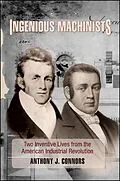Ingenious Machinists recounts the early development of industrialization in New England and New York through the lives of two prominent innovators whose work advanced the transformation to factory work and corporations, the rise of the middle class, and other momentous changes in nineteenth-century America. Paul Moody chose a secure path as a corporate engineer in the Waltham-Lowell system that both rewarded and constrained his career. David Wilkinson was a risk-taking entrepreneur from Rhode Island who went bankrupt and relocated to Cohoes, New York, where he was instrumental in that city's early industrial development. Anthony J. Connors writes not just a history of technological innovation and business development, but also two interwoven stories about these inventors. He shows the textile industry not in its decline, but in its days of great social and economic promise. It is a story of the social consequences of new technology and the risks and rewards of the exhilarating, but unsettling, early years of industrial capitalism.
Autorentext
Anthony J. Connors is an independent historian and the editor of the first volume of Conflicts in American History: A Documentary Encyclopedia. He lives in Westport, Massachusetts.
Inhalt
List of Illustrations
Acknowledgments
Introduction: Machinists in the Early Republic
1. Industrial Glimmerings: Massachusetts before 1790
2. Revolutionary Technology: Rhode Island, 1775-1790
3. The Progress of a Textile Machinist: Paul Moody, 1794-1814
4. Oziel's Son: David Wilkinson, 1790-1815
5. Company Man: Paul Moody at Waltham, 1813-1823
6. Toward Wilkinsonville: David Wilkinson, 1815-1828
7. Respectable Company Man About Town: Paul Moody at Lowell, 1823-1831
8. "We All Broke Down": David Wilkinson, 1829-1852
9. Ingenious Machinists
Notes
Glossary of Textile and Machine Tool Terms
Essay on Sources
Bibliography
Index
